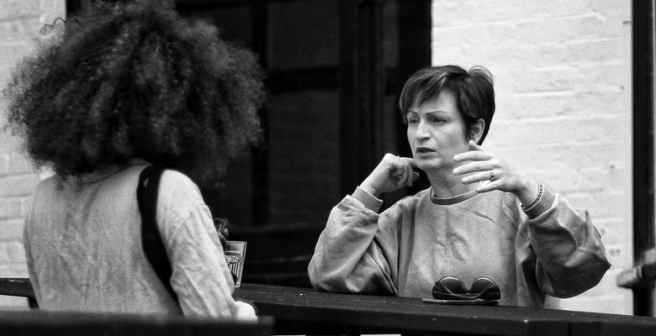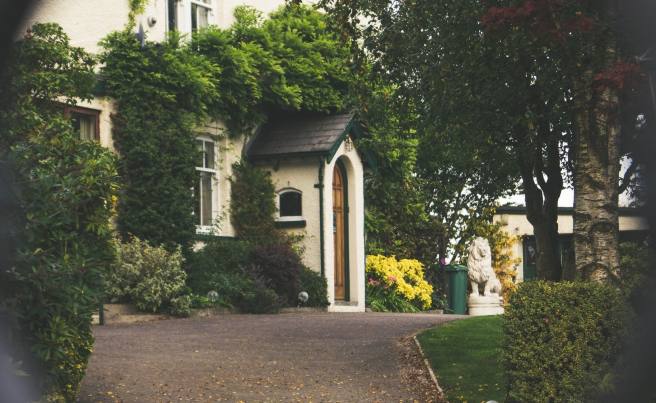I understood that you cannot underestimate the importance of your guide as a researcher

I was always inquisitive, even as a child. My family would always find me tucked in the warmth of my bed, silently reading a book. My interests were varied but I loved reading the most — especially books on Indian Mythology. I was an imaginative and deeply contemplative child. My schooling in Kendriya Vidyalaya, a school run by the Central Government of India, was the best thing that happened to me. This is what groomed me into a multitasking student with multiple interests.
It didn’t take me long to decide that I didn’t want to follow the beaten track. In an era where Engineering and Medicine were the usually chosen subjects, especially within conservative South Indian families, I took up Home Science for my undergraduate studies. While studying Home Science, I found myself interacting with underprivileged women with an ease that others were unable to achieve. I noticed this especially while trying to explain to those women, the nuances of nutrition, healthy ways of cooking and eating right, and so on. Their lifestyle resonated with me and I found myself identifying with their joys and sorrows. I was particularly moved by the numerous ways in which they took up subsidiary, income-generating activities to improve their families’ socio-economic condition. With a natural flair for the different subject areas in Home Science, I graduated with flying colours.
My next decision to pursue post-graduation in Business Administration, an MBA, was driven by my father, a banker, who specialised in agricultural and rural banking. I took to the change in streams, from Home Science to Business Administration, like a fish to water. My exposure to various fields of study, which had started during my early childhood, made the transition easy for me. My father also helped me realise my potential when I expressed reservations regarding my course of study.
On the first day of my MBA studies, I attended an interesting lecture by a professor delivered a lecture, who had a doctorate in Management. After her class, when it was time for Q&A, I asked her only one question: “What do I have to do to obtain a doctorate in Management?”
During the last semester of my MBA, I was introduced to the concept of microfinance while working on a project and soon, realised that I had a penchant for research and analysis. My inquisitive nature, coupled with my exposure to poor women and their struggles for survival, had created in me a deep interest in research in the social sciences and humanities. It was serendipitous that after my MBA I landed a job as a research associate in a premier management research institute. Here I picked up skills for conducting research, collecting and analysing data, interpreting the results, report writing, and writing case-studies. The next destination in my journey was inevitable. Soon after, I took up a full-time doctoral course at Andhra University. I couldn’t be happier, but I also knew that I had an arduous task ahead of me that required utmost dedication and focus. Thanks to my experiences working with underprivileged women, it was easy for me to pick a topic that I was passionate about– Micro Finance and Empowerment of Women.
I was blessed to find a great guide— Professor P. Veni, in the department of Commerce and Management Studies at Andhra University. She let me choose a topic and held my hand as I floundered in the dark. She was a strong source of support and guidance for me throughout, lifting my spirits when I was demotivated, sharing her experiences with me to help me learn better, and propelling me to achieve my desired goals. I feel her influence not only in my research but also in life, as she really helped me realise my true worth and capabilities. I understood that you cannot underestimate the importance of your guide as a researcher.
A lot of changes took place in my life during the three years of my research. I got married and found myself in a quagmire. Though I was married to a very educated individual who I thought would understand my time, energy, and financial requirements, he did not. Contrary to my expectations, I found that I was expected to juggle the duties of home and work with ease, without uttering a single word and without sharing my feelings with anyone. There were huge expectations from me but little support and encouragement.
Three months into my marriage, I was pregnant and soon found myself battling morning sickness alongside domestic violence. My confidence was questioned, my capabilities ridiculed, and my very existence undermined. I was told that a lot was expected of me but I was falling short of everyone’s expectations. I was humiliated and the violence and abuse I faced was physical, emotional, and psychological. I couldn’t share my pain with anyone. Not even my parents. I was kicked and beaten black and blue during the seventh month of my pregnancy. At this point I was utterly dejected and felt that women are still treated like second-class citizens, no matter which strata of the society they belong to. Academic achievements do not guarantee cultured and civilized behaviour. I realised that deep down, there was no difference between me and the underprivileged women I had come across and interacted with during my days of data collection— we were all struggling to survive.
The only respite seemed to be provided by my research that gave me an excuse to get out of the house. Every month, I had to travel from Hyderabad to another city, Vishakhapatnam, to work on my research and discuss my progress with my guide. Godavari Express, the train I took to travel, became my second home. Fortunately for me, the South Indian custom of pregnant women in their last trimester moving back to their parents’ homes, for the ritualistic baby shower and for a safe delivery is what saved me from further torture and trauma.
Once in the safe confines of my parents’ home, I focused on my research while my parents and sister pampered and cared for me. So once again I regained my strength and confidence and realigned my strategies. All I wanted to do was submit my thesis as soon as possible, while taking care of my health and mental well-being. The next two months were hectic and strenuous, both for my health and my research. I spent days documenting the results of my survey, analysing and interpreting them, creating tables and graphs, or using statistical tools. I didn’t realise that I had slowly slipped into the eighth month of pregnancy. The hot and humid weather of May in my hometown started taking its toll on me.
During one of my routine visits to the gynaecologist, I was told that I had very little amniotic fluid and hence had to be very careful. I was also troubled by insomnia and had a higher than normal blood pressure, both of which were serious concerns. I cannot explain the amount of care, concern, and attention I received from my guide during that phase in my life.
It had been three years since I had registered for my PhD and I just wanted to submit it on time. Research is a time-bound activity. The more you delay, the more are the complexities involved. As such, I wanted to submit my thesis on time.
I still shudder when I remember the days I spent at the printing and binding shop till 2 am, overseeing the printing of my thesis. The proprietor was really worried about my determination given the condition I was in and didn’t want me to deliver my baby in his shop. I remember him admonishing me, with concern of course, for having chosen this time of my life for such a strenuous job as thesis work. I was quite oblivious to all this; the only thing on my mind was that I needed to finish my thesis work in time. I also knew very well, that lord Hanuman (the Indian Monkey God who symbolises strength, valor, courage, and determination), would definitely look after the child in my womb.
Finally, after all the trials and tribulations, I submitted my thesis on the 31st May, 2007. I was happy, relieved, flummoxed, and surprised. A cocktail of emotions was stirring up. I felt that I could finally truly experience my pregnancy, eat, sleep, watch movies, and relax. I still had almost a month to go for my delivery according to my doctors. I had started calling my baby my “post-doctoral fellow”!
“Man plans and God laughs” is my favourite adage. 11th June, 2007, my water broke and I had to be rushed to Emergency. I had to be operated on immediately and the doctors reminded me to stay calm to avoid becoming hypertensive. I knew it was time and I had to show presence of mind, trust the doctors, and have faith in the Almighty. I knew it would be fine. The fighting spirit in me reminded me of all my struggles and pushed me to go on. The mother in me knew my child would be safe. I found myself feeling more empowered than ever before. I was smiling as I entered the operation theatre. And exactly at 9 am that Monday morning, I gave birth to a beautiful, healthy baby boy. I smiled as I regained consciousness. I knew the heavens were smiling at my grit and determination.
My guide was one of the first to be told about the good news. She was as happy as my mother. Six months into motherhood, between nappies, feeding, vaccinations, sleepless nights and the joy of holding my bonny baby, I was told that my evaluations were in and my thesis defence was held on the 30th Jan, 2008. The doctoral degree was officially conferred to me.
Life went by and ten years later, I found myself working, trying to adjust to the vagaries of life, enduring my divorce and custody battle as a single mother trying to manage my career and my child’s education and needs. One lazy Sunday afternoon, I received a phone call from a research scholar of my former guide, telling me that she was retiring soon. I knew it was the right time for me to express my gratitude to her, for all the tangible and intangible support she had given me. After all, she had been my rock.
At her retirement party, I was flooded by the memories of the days I had spent with her as an academic, learning in her company. I realised that it takes a lot to be a teacher, a guide, and a mentor to all those students who are dreaming of bright futures, ignorant of all the hurdles that they have to cross on their paths to success. As I saw her among so many of her students, I realised what she meant to me. She was the mother who never bore me but gave me and my child a new lease on life by guiding me in my research life. I was overwhelmed to see her and didn’t realize that I was weeping tears of joy and gratitude. I knew the wheel had turned and it was my turn to shoulder the responsibility. I owed it to her. I had to become a good teacher to my students.
Connecting the dots, now looking back, I always knew I would be an empowered woman.
Now, as a management teacher overseeing numerous engineering students, I know my responsibility goes beyond teaching. I know I have to constantly work towards becoming a better version of myself. I know the real wealth of life lies in the satisfaction of knowing that I have done my job right. I am proud to be a teacher.







